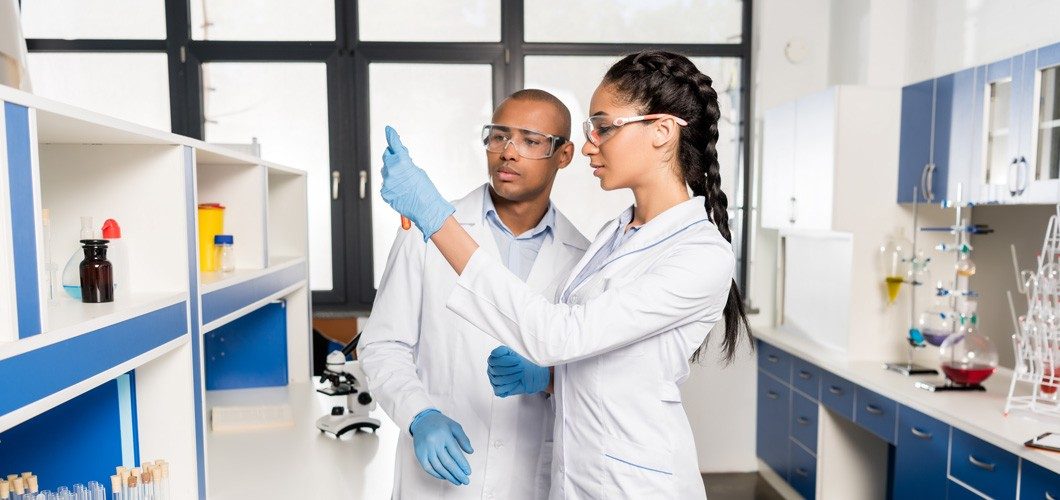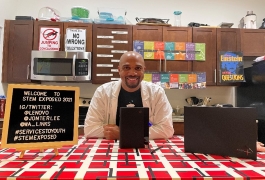Make the Most of Your Summer Internship

Finals are over (![]() ), and now it’s time to gear up for your summer internship. You’ve been told over and over that internships are great opportunities, but what does that mean? What can you expect from the summer, and how do you make the most of a real-world professional experience?
), and now it’s time to gear up for your summer internship. You’ve been told over and over that internships are great opportunities, but what does that mean? What can you expect from the summer, and how do you make the most of a real-world professional experience?
We talked to students who participated in the 2018 SCI Scholars Program—a competitive internship program that exposes chemistry and chemical engineering students to careers in industry—for their advice on getting the most out of a workplace experience. Here’s what they had to say.
Find your home early
Securing a place to live for the summer is the number one item on your to-do list. Some internships come with funds for relocation; a few even provide housing. But for most, you are responsible for finding a place to live.
If you are lucky enough that your company provides intern housing, make sure you get your paperwork in order as soon as possible. If the company doesn’t provide housing, you will need to do a little research to find affordable living accommodations in an area with a decent commute. The human resources department may be able to give you leads, but don’t count on it. A real estate company or apartment-locating service can help you find something that is within your budget and reasonably close to the job site. Also check with local colleges and universities. Because your assignment is during the summer, they may be able to connect you to student-friendly rentals near the campus.
“As important as the job is, learning to make wherever [you are] home is equally important,” says Patrick Cable of the University of Maryland (internship: ExxonMobil Chemical). Familiarize yourself with where you’ll be spending the next two to three months, and as you get to know co-workers or fellow interns who are from the area, don’t be shy about asking them to show you around.
Treat the internship as an extended interview
It is common for companies to use internships as a way to screen potential employees. Interns who do well may end up with a job offer. “I wish I had known that most companies are using this summer co-op as a long interview process,” says Lisa Je of Dartmouth College (internship: LyondellBasell).
Reflecting on her SCI internship, she realized in retrospect that you have to treat every moment as part of the interview. Pay attention to those nontechnical details, such as showing up each day on time, having a good work ethic and attitude, being passionate about your job, being prepared, being coachable, treating everyone with respect, and avoiding the “gossip pool.”
Your interactions with everyone—supervisors, technicians, administrative assistants, building and maintenance staff—will be observed and evaluated. You will be working with people with diverse backgrounds and interests. Adapting to a new environment and making connections with people will be good practice for when you start your career, and leave a good impression with the employer.
Your “on-the-job interview” does not end with the work site. If you post on social media, be mindful of what you expose about your personal life. Excessive partying, insulting or offensive social media posts, or anything objectionable you do in your downtime could reflect poorly on the company and your professional image. On the flip side, many companies partner with local charities and social organizations; if their interests overlap with yours, getting involved is a great way to leave a good impression with the company.
Remember that interviews work both ways. While the company is evaluating your performance, you also have the opportunity to assess whether the company is a good fit for you. Take the time to get to know the organization and your colleagues. If you can’t see yourself working there for a career, you don’t have to accept any offers that may come your way. You can always ask your new contacts to connect you with companies that might be a better fit.
Be prepared to work differently
Natalie Bukovec of Miami University (internship: Trinseo) got a reality check on just how demanding a full-time job at a company can be. “One thing that I wish I would have known before my internship started is that a typical full-time work schedule takes some getting used to,” she says. “As a chemistry or chemical engineering major, you are already used to working hard, but working hard in industry means working a straight eight-hour day, and a break for lunch or a task that just doesn't end at 5:00 p.m. will make your day longer.”
On the plus side, there is no homework or off-hours projects, so your downtime really is downtime. Although vacation days for interns are rare, most supervisors understand if you are too sick to work or if an important event, such as a professional development workshop or an important family obligation, requires you to be away from work. Just be sure to talk with your supervisor as far in advance as possible if you know you need time off.
Another change to adjust to is that there are many more safety protocols and procedures. The government regulations are stringent for industrial labs, and the quantities of potentially hazardous substances are large. Industrial-scale accidents can have an enormous impact, so safety is a top concern. Security, whether it be to protect from corporate espionage, vandals, or even terrorists, is also a lot tighter than it is for academic labs.
Learn and learn some more
“One thing I realized soon after I started my internship was that no matter how hard you study for your classes, you won't be fully prepared to work in a plant,” says Andrew Min of the University of Michigan (internship: Honeywell). And Devin Dykes of the University of Minnesota (internship, Westlake Chemical) agrees, “Reading and understanding a P&ID [piping & instrumentation diagram—a detailed diagram of lab or plant equipment] is a very basic skill for industrial engineers, but I had never seen one before I started my internship.”
Fortunately, interns are expected to learn on the job. “Before my internship started, I was very nervous that I would not be prepared,” says Kathleen Spagnoletti of Villanova University (internship: LANXESS). “However, once I got to my internship, I found that everyone there was eager to teach me about what they do and help me learn all about the processes within the plant.”
It's okay if you don’t know everything; just be prepared to find out the answer. If you don’t know something, look it up. If you can’t find the answer, or if something is just plain confusing, ask questions.
Jadallah Zouabe of Cuesta College (internship: Trinseo) advises interns not to fear their supervisors or managers. “They are usually easier to talk to than you think,” she says, “and they're loaded with experience and connections, so it's really important [that] interns pick their brains when they get a chance.”
Supervisors aren’t the only people with answers. Min found the operators at his company to be a great resource. “The operators that have been working in the plant for longer than you or I have been alive have a lot of knowledge to share and can make your job infinitely easier.” Long-time operators, technicians, and other bench staff are intimately familiar with the equipment, processes, and company procedures that you don’t learn in school.
“Getting to know the operators really exercised my communication skills,” Min says. “They made a good number of my projects much more manageable.” These folks may not have a bachelor’s degree, but their hands-on experiences are invaluable. Most technicians will tell you more than what you ever wanted to know about a process or procedure, if given the opportunity. Take advantage of that knowledge and experience!
Talk to as many people as possible, even before you start
Many of the 2018 SCI Scholars say that they wish they had known more about their projects before they started work. In many cases, you can reach out to your supervisor prior to starting your summer work. They will appreciate the initiative, says John Beckham of the University of Georgia (internship: LANXESS). Once you’re on-site, extend yourself by talking to managers and operators outside of your supervising unit, he adds. Talking to people outside of your immediate work group enables you to learn more about the company and how it works. You will find ways to do your job better and opportunities to shine. Getting to know people across the company also expands your network. Everyone you meet is a potential contact who can help you develop your career further down the line.
Take the initiative
Showing up for work on time, dressing appropriately, and completing tasks to the best of your ability are minimum expectations for the workplace. But you want the hiring company to see you as a future professional. Once you have your assigned tasks in-hand, it will be up to you to boost yourself by taking the work to the next level. Proposing ideas or projects for yourself is one way to stand out, says Beckham. “By the time I left at the end of summer, I felt that the most informative projects I worked on were the ones I had helped to plan or execute.”
If you find that you are not being challenged, find ways to make additional contributions. Keep your eyes and ears open for opportunities. If your ideas are not accepted, learn more about why, and use that feedback to create more effective proposals. Your supervisors and colleagues will appreciate your initiative, and you will learn a lot about navigating an industrial workplace.
“An individual gets out what they put in,” says Zouabe. “If one shows up to work, puts in their time, and goes home, the individual won't get much out of their internship. Whereas if the intern asks for additional responsibilities, reaches out to set up departmental tours, or schedules meetings with people of interest, the intern can learn and experience a lot more.”
It truly is up to you to make the most of your internship.



